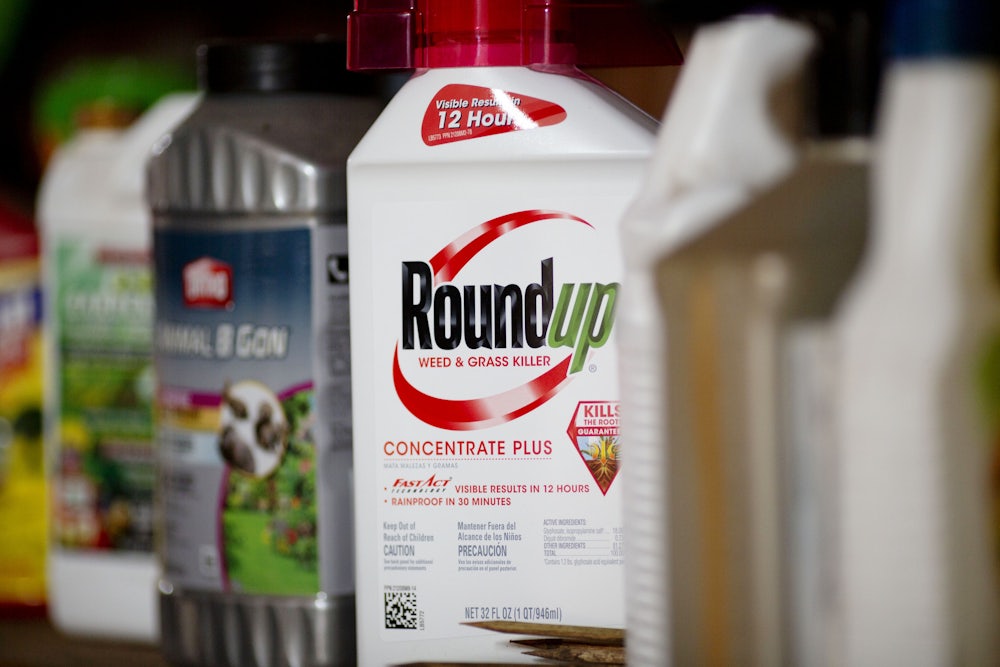Six years ago, the multinational corporation Bayer made one of the worst purchases in American business history: It bought Monsanto, the maker of Roundup, for $63 billion. Monsanto was already being sued by a school groundskeeper in the Bay Area who said his exposure to the weedkiller had given him non-Hodgkin’s lymphoma. Two months after the merger, a jury awarded the groundskeeper $289 million. Since then, Bayer has been pummeled with lawsuits, and between settlements and jury verdicts, it has been required to pay out more than $14 billion to plaintiffs. Its stock has lost 70 percent of its value.
Desperate to reassure investors, the company has been fighting back with every means at its disposal. Its latest effort: lobbying state legislatures to shield it from future lawsuits and to annul at least some of the 50,000 claims that are currently active.
Since January, bills to shield pesticide manufacturers from lawsuits have been filed in three states where Bayer has a major corporate presence: Missouri (where Monsanto is headquartered), Idaho (where it has a phosphate mine), and Iowa (where it has a manufacturing plant). Daniel Hinkle, an attorney with the American Association for Justice, who works with trial lawyer associations throughout the country, predicted that if these bills succeed, Bayer will push similar legislation in a number of other states next year.
The company’s efforts have been supported by other agribusiness allies. Legislation of the kind they’re promoting would have implications for all pesticide manufacturers—especially Syngenta, one of Bayer’s competitors, which is facing a lawsuit over the pesticide paraquat from some 5,300 patients with Parkinson’s disease. Hinkle believes the bills would “condone” these companies’ “reported history of deception and fraud,” while putting the public at greater risk.
One reason these class-action lawsuits have proliferated lately is that federal regulations of pesticides are extremely lax. Documents unearthed during the lawsuits, and reports from current and former scientists at the Environmental Protection Agency, have made it clear that the EPA’s pesticides office has been largely bought off by the companies it’s supposed to regulate.
“People need a way to seek recompense on the back end,” said Nathan Donley, a senior scientist at the Center for Biological Diversity and a longtime Bayer critic. “That’s why we’re seeing a lot more of these lawsuits coming up: People are getting harmed.”
It’s far from guaranteed that state legislation to protect pesticide manufacturers will make it through. The bill in Idaho has already been met with considerable bipartisan resistance. But if the bills succeed, they will limit the only mechanism left for holding the manufacturers of these products accountable for the damage they cause.
It’s hard to overstate how thoroughly Monsanto dominated the commercial agriculture industry during the company’s heyday—and also how much Roundup contributed to this. The formula for the herbicide was developed in 1970, when a scientist in Monsanto’s St. Louis lab came up with a chemical that could work its way into weeds and kill them at the root. In 1974 it was introduced to the commercial agriculture market. Twenty-two years later, Monsanto introduced a companion product that was equally valuable: seeds of genetically modified plants that could be sprayed with Roundup without being harmed. As of last year, more than 90 percent of soybean, corn, and cotton crops were genetically engineered to resist the chemical.
At the same time, researchers—including some of Monsanto’s own scientists—had evidence at least as early as the 1980s that Roundup’s main ingredient, glyphosate, was a potential carcinogen. In a study the company conducted between 1980 and 1982, mice that were exposed to Roundup developed tumors at statistically significant rates, whereas mice that weren’t exposed had no tumors. In an email to The New Republic, Bayer dismissed these results, saying independent analyses ultimately concluded that the study did not suggest evidence of carcinogenicity. Over the last two decades, however, there’s been a flood of other studies investigating that connection (and mostly affirming it).
Dewayne Johnson, the California groundskeeper who successfully sued Monsanto, makes a vivid case study. During Johnson’s employment with the Benicia Unified School District, he sprayed Roundup around school properties 20 to 30 times each year. On one occasion, Johnson’s hose broke, and he was soaked in the chemical. In 2014, after just two years on the job, he had lesions all over his body.
In 2015, the International Agency for Research on Cancer classified glyphosate as “probably carcinogenic to humans.” Many countries, from Germany to Saudi Arabia, have banned or restricted the chemical’s use. The EPA, however, has repeatedly stated that glyphosate poses “no risks of concern to human health” when it’s used as the manufacturer advises.
The EPA’s pesticides office seems to suffer from a severe case of regulatory capture. One EPA official reportedly told a Monsanto lobbyist in 2015 that he was trying to stop another agency’s investigation into glyphosate, and added, “If I can kill this I should get a medal.” And a retired EPA scientist told Al Jazeera last year that almost every new pesticide application the agency receives gets approved, “no matter how high the risk.… Pesticide companies, and their congressmen, have tremendous influence on EPA’s decisions.” (An EPA spokesman told The New Republic the agency “rejects the inappropriate and unfounded notion” that its staff and decisions are “influenced by external interests.” It “relies on the best science available and evaluates information from multiple sources” in its evaluation process, he said.)
Following the international body’s report on glyphosate, in 2015, hundreds of Americans started suing Monsanto, in both federal and state courts, saying Roundup had given them cancer. In the weeks before Johnson’s legal victory, in mid-2018, the number of lawsuits was around 8,000. By the following spring, it was up to 13,400.
All told, many of those suits have succeeded, either through settlements or jury verdicts. In 2020, Bayer agreed to a settlement of more than $10 billion for roughly 95,000 federal plaintiffs. And last year, it lost civil trials in St. Louis, San Diego, and Philadelphia. The company has repeatedly asked appellate courts, including the Supreme Court, to dismiss the ongoing lawsuits, but so far all of these requests have been turned down.
Not that Bayer has consistently lost in court. As of this month, it has prevailed in 13 of the last 20 Roundup trials. The company told The New Republic these results validated its “strategy of taking cases to trial based on the overwhelming weight of scientific research and assessments” that glyphosate doesn’t cause cancer.
Nevertheless, the company has also taken its fight to legislatures. Perhaps the most favorable outcome for Bayer would to see a sweeping federal law passed by Congress—one that would not only shut down most of the lawsuits but would also prevent state and local governments from putting restrictions on pesticide use. There’s currently an amendment to this effect tacked onto the farm bill, which is set to be renewed in September. However, that amendment is also facing fierce opposition. More than 150 lawmakers signed a letter to the House Agriculture Committee last fall, urging it to reject the preemption measures.
To hedge its bets, Bayer is now going directly to statehouses as well. Idaho’s Senate Bill 1245, the first of its kind to appear this year, was introduced on January 24. Its chief sponsor is state Senator Mark Harris, a Republican who hails from Soda Springs, a town of some 3,100 in the state’s southeastern corner. Just outside the city limits, Monsanto operates an 800-acre compound that includes a phosphate mine and a processing plant.
In general, most of the successful lawsuits against Bayer have shared the same legal basis: the claim that Roundup should have had a warning on its label, saying there was a chance the product would cause cancer. This kind of legal claim is exactly what’s being targeted in Idaho’s proposed legislation. If the bill passes, state residents will no longer be able to sue on the basis that the label on a pesticide product was misleading, as long as the label has been approved by the EPA.
When Senator Harris touted the bill before a legislative committee in early February, his remarks were brief. He told the committee the state’s farmers couldn’t afford to lose “the agriculture pesticide products they depend on,” which are manufactured in the United States. If Idahoans had to buy alternatives that were made overseas, he said, they’d be subject to more supply chain disruptions. Then Harris turned the majority of his time over to James Curry, a Bayer lobbyist, who defended the bill in detail, speaking for more than twice as long as Harris had.
The hearings in Idaho have been accompanied by other efforts outside the Capitol. For instance, Bayer has recently donated to the campaigns of key state legislators, including the speaker of the House. Its allies have also invested heavily in local advertisements. For several days in a row, leading up to a critical vote, there was a full-page, color ad in each of Boise’s daily newspapers—and in other news outlets around the state—promoting the bill.
The legislation Bayer has pushed in other statehouses is more or less identical to the bill in Idaho, and the advocacy playbook has also been similar. The Iowa bill was introduced on January 31, and when it came before a legislative committee, Bayer lobbyists were the only people who came to testify in support. A company lobbyist also testified on behalf of a similar bill in Missouri in early March.
All three of these are states where legislators are likely to feel some stake in Bayer’s future, because they’re places where the company employs a significant number of people and pays state and local taxes. They’re also states with major agriculture industries—and powerful agribusiness lobbyists. Hinkle predicted that if the bills in this first round are successful, Bayer will push similar legislation in another 10 to 15 states next year, while making a stronger case for a federal law protecting it from lawsuits.
It’s unclear whether even the bills in this first cluster will succeed. Last month, Idaho’s Senate voted down a version of the legislation, 19–15 (though another version is still moving through the state’s House of Representatives). Twelve of the 19 “no” votes were cast by Republicans. Jonathan Oppenheimer, the government relations director of the Idaho Conservation League, said some of the resistance came from a newer segment of GOP lawmakers, whom he described as “independent-minded” while particularly right-wing. These legislators apparently believed Bayer’s bill gave too much deference to the EPA and encroached on the state’s sovereignty.
Oppenheimer said some also seemed perturbed by the notion that it would protect Syngenta, Bayer’s competitor, which is owned by the Chinese government’s China National Chemical Corporation, from lawsuits from people saying paraquat gave them Parkinson’s. But whether similar alliances of liberals and conservatives will form in states like Missouri and Iowa remains to be seen.
Bayer is using a playbook similar to the one asbestos companies have been using since at least the 2010s and the tobacco industry used for decades. At a certain point, leaders in each industry stopped worrying much about public sentiment and instead simply pleaded with courts and legislatures to shield them from lawsuits (or at least limit their vulnerability). A 1992 memo from the tobacco company Philip Morris expressed this attitude bluntly: “Public opinion and media coverage are only important insofar as they affect the government—we will never be liked and what we want is to be ignored.”
Ultimately, with both the asbestos and tobacco industries, the rights of consumers to file lawsuits have remained intact, and the litigation has sometimes led to meaningful changes in the ways these companies do business. Likewise, Bayer announced in 2021 that it would stop selling glyphosate-based Roundup for residential use by the end of last year (although it’s still available at Home Depot and other stores). When contacted for comment about this piece, a Bayer representative told me that “Bayer stands fully behind our glyphosate-based Roundup products, which have been used safely and successfully around the world for decades.”
For advocates like Nathan Donley, who have little hope that the regulatory agencies will change course on pesticides, this accountability mechanism—along with the cash awards that sometimes go to plaintiffs—is the reason so much rides on keeping litigation open as a means of recourse. “A company that has no fear of liability,” he said, “is a very scary thing.”








